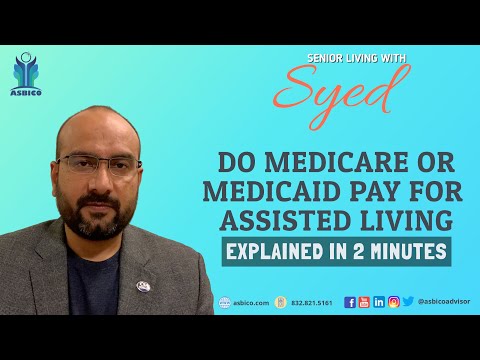Does Medicare or Medicaid Cover Assisted Living?
Contents
- Does Medicare or Medicaid Cover Assisted Living?
- What is Assisted Living?
- What Services are Provided in Assisted Living?
- Who Pays for Assisted Living?
- How Much Does Assisted Living Cost?
- How Do I Choose an Assisted Living Facility?
- What Are the Different Types of Assisted Living Facilities?
- What Should I Look for When Touring an Assisted Living Facility?
- How Do I Pay for Assisted Living?
- What Are the Alternatives to Assisted Living?
If you’re wondering if Medicare or Medicaid will help pay for assisted living you’re not alone. It’s a common question, and the answer isn’t always simple. In this post, we’ll break down what you need to know about Medicare and Medicaid coverage for assisted living.
Checkout this video:
Does Medicare or Medicaid Cover Assisted Living?
Original Medicare, Part A and Part B, generally does not coverlong-term care services, such as the type of care provided in an assisted living facility However, Medicaid does provide some coverage for assisted living for low-income seniors.
If you need help paying for assisted living, you may want to consider a long-term care insurance policy. These policies can help cover the cost of assisted living and other long-term care services.
What is Assisted Living?
Assisted living is a type of senior housing that provides support with activities of daily living, such as bathing and dressing, in a safe and secure setting. Assisted living residences are typically smaller than nursing homes and allow residents to live as independently as possible while still receiving the care they need. Most assisted living facilities also offer social and recreational activities, as well as transportation services.
Medicare does not cover the cost of assisted living, but Medicaid does provide some coverage for assisted living costs in some states. If you are considering moving into an assisted living facility be sure to check with your state’s Medicaid office to see if coverage is available.
What Services are Provided in Assisted Living?
There is a lot of confusion about what services are provided in assisted living, and whether or not Medicare or Medicaid will cover the cost. In general, assisted living provides help with activities of daily living, such as bathing, dressing, eating, and using the restroom. It also offers 24-hour supervision and security, along with meals, snacks, and transportation. Some assisted living facilities also provide additional services, such as housekeeping, laundry, and recreational activities.
Medicare does not cover the cost of assisted living; however, Medicaid does cover some of the costs in some states. It is important to check with your state’s Medicaid office to see what coverage is available.
Who Pays for Assisted Living?
There is no definitive answer to the question of who pays for assisted living. In some cases, Medicare or Medicaid may cover part or all of the cost, but this is not always the case. It is important to check with your specific provider to see what coverage they offer. In many cases, private insurance plans may also offer some coverage for assisted living expenses.
How Much Does Assisted Living Cost?
There is no definitive answer to how much assisted living costs, as it can vary greatly depending on the location, type of facility, and level of care required. That said, according to a 2018 study by Genworth Financial, the average monthly cost of assisted living in the United States is $4,000.
This cost can be covered by Medicare or Medicaid, although the coverage is not always comprehensive. In general, Medicare does not cover the cost of long-term care in an assisted living facility, although it may cover some short-term stays. Medicaid, on the other hand, does cover long-term care costs in some cases. Assisted living facilities that participate in Medicaid usually have special requirements for admission, so it is important to check with the facility before applying.
How Do I Choose an Assisted Living Facility?
There are many factors to consider when choosing an assisted living facility. The most important factor is whether or not the facility is covered by Medicare or Medicaid. Other important factors include the cost of the facility, the location, the amenities, and the staff.
What Are the Different Types of Assisted Living Facilities?
There are several different types of assisted living facilities, all of which offer different levels of care and services. The type of facility that is right for you will depend on your individual needs and preferences.
Independent Living Communities: These communities are designed for seniors who are able to live independently but may need some assistance with activities of daily living, such as housekeeping or transportation.
Assisted Living Communities: These communities offer more comprehensive services, such as help with bathing, dressing, and medication management. Residents typically have their own private apartments or bedrooms.
Memory Care Communities: These communities provide specialized care for seniors with Alzheimer’s disease or other forms of dementia. Services may include 24-hour supervision, activities designed to stimulate cognitive function, and a secured environment to prevent wanderin
What Should I Look for When Touring an Assisted Living Facility?
There are a number of important factors to consider when touring an assisted living facility for a loved one. With so many factors to consider, it can be helpful to make a list of the most important features before beginning your tour. Here are some of the things you should look for when touring an assisted living facility:
-The physical facility should be clean, well-maintained, and safe.
-The staff should be professional, caring, and attentive.
-The residents should appear happy and engaged in activities.
-There should be a variety of activities and amenities available for residents.
-The cost of the facility should be affordable and fit within your budget.
How Do I Pay for Assisted Living?
There are a number of ways to pay for assisted living, including private pay, government assistance, and long-term care insurance.
Private pay is when the individual or their family pays for assisted living out of pocket. This is the most common type of payment, as many assisted living facilities do not accept government assistance.
Government assistance, such as Medicare or Medicaid, can help cover the cost ofassisted living in some cases. However, each state has different rules about what types of care are covered and how much assistance is available. It’s important to check with your state’s Medicaid office to see if you qualify.
Long-term care insurance is another option to help cover the costs of assisted living. This type of insurance policy typically covers a set amount per day for a certain number of years. The coverage can be used for any type of long-term care, including assisted living, nursing home care and in-home care
What Are the Alternatives to Assisted Living?
If you are considering assisted living for yourself or a loved one, you may be wondering whether Medicare or Medicaid will cover the costs. Unfortunately, neither of these government-sponsored programs provides direct funding for assisted living. However, there are a few ways that Medicare and Medicaid can help with the costs of assisted living.
One way that Medicare can help is through its skilled nursing facility benefit. This benefit pays for a limited amount of care in a skilled nursing facility, which must meet certain standards set by Medicare. While skilled nursing facilities are not the same as assisted living facilities, they can provide some similar services, such as help with activities of daily living and personal care services.
Medicaid also offers some assistance for people who need long-term care, including those who require the level of care provided in an assisted living facility. Medicaid’s long-term care benefit is known as the Community Options Program and it provides funding for a variety of long-term care services, including assisted living. Each state has its own rules about who is eligible for this program and what services are covered, so it’s important to check with your state’s Medicaid office to see if you or your loved one qualify.
In addition to government-sponsored programs like Medicare and Medicaid, there are also a number of private insurance policies that offer coverage for assisted living expenses. These policies vary widely in terms of what they cover and how much they cost, so it’s important to do your research to find a policy that meets your needs. You can also check with your local Area Agency on Aging to see if they offer any assistance with the cost of assisted living.






